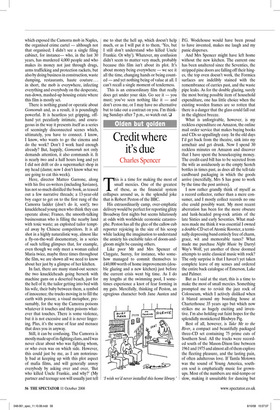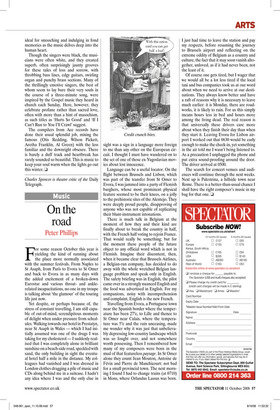Credit where it’s due
Charles Spencer
This is a time for making the most of small mercies. One of the greatest of these, as the financial system collapses around us, is the splendid joke that is Robert Peston of the BBC.
His extraordinarily camp, over-emphatic delivery would be perfect for reporting glitzy Broadway first nights but seems hilariously at odds with worldwide economic catastrophe. Peston has all the glee of the callow cub reporter rejoicing in the size of his scoop while lacking the imagination to understand the anxiety his excitable tales of doom-andgloom might be causing others.
Like poor Mr and Mrs Spencer of Claygate, Surrey, for instance, who somehow managed to commit themselves to £40,000 worth of home improvements (double glazing and a new kitchen) just before the current crisis went big time. As I do my lengths at the swimming pool, I sometimes experience a knot of fear forming in my guts. Mercifully, thinking of Peston, an egregious character both Jane Austen and P.G. Wodehouse would have been proud to have invented, makes me laugh and my panic disperses.
And Mrs Spencer might have left home without the new kitchen. The current one has been unaltered since the Seventies, the stripped pine doors are falling off their hinges, the top oven doesn’t work, the Formica surfaces are indelibly stained with the remembrance of curries past, and the waste pipe leaks. As for the double glazing, surely the most boring possible item of household expenditure, one has little choice when the existing wooden frames are so rotten that there is a danger that the glass could fall out in the slightest breeze.
What is unforgivable, however, is my reckless expenditure on Amazon, the online mail order service that makes buying books and CDs so appallingly easy. In the old days I’d get back from the theatre, sink into my armchair and get drunk. Now I spend 30 reckless minutes on Amazon and discover that I have spent the housekeeping money. The credit-card bill has to be secreted from the wife as assiduously as the empty Scotch bottles in times past, as does all the tell-tale cardboard packaging in which the goods arrive (mercifully, Mrs S has gone to work by the time the post arrives).
I now rather grandly think of myself as a record collector, rather than a mere consumer, and I mostly collect records no one else could possibly want. My most recent aberration has been for the more obscure and lunk-headed prog-rock artists of the late Sixties and early Seventies. What madness made me think it was essential I owned a double-CD set of Atomic Rooster, a terminally depressing band entirely free of charm, grace, wit and memorable tunes? What made me purchase Night Music by Darryl Way’s Wolf, yet another of those doomed attempts to unite classical music with rock? The only surprise is that I haven’t yet taken complete leave of my senses and ordered the entire back catalogue of Emerson, Lake and Palmer.
But as I said at the start, this is a time to make the most of small mercies. Something prompted me to revisit the jazz rock of Colosseum, which I actively disliked when it blared around my boarding house at Charterhouse 35 years ago but which now strikes me as hugely exciting and inventive. I’m also holding out faint hopes for the splendidly monickered Blodwyn Pig.
Best of all, however, is Take Me to the River, a compact and beautifully packaged three-CD set containing 75 prime cuts of Southern Soul. All the tracks were recorded south of the Mason-Dixon line between 1961 and 1975 and almost all of them explore the fleeting pleasure, and the lasting pain, of often adulterous love. If Tamla Motown was the sound of Young America, southern soul is emphatically music for grownups. Most of the numbers are mid-tempo or slow, making it unsuitable for dancing but ideal for smooching and indulging in fond memories as the music delves deep into the human heart.
Though the singers were black, the musicians were often white, and they created superb, often surprisingly jaunty grooves for these tales of loss and sorrow, with throbbing bass lines, edgy guitars, swirling organ and punchy brass sections. Many of the thrillingly emotive singers, the best of whom seem to lay bare their very souls in the course of a three-minute song, were inspired by the Gospel music they heard in church each Sunday, Here, however, they celebrate profane rather than sacred love, often with more than a hint of masochism, as such titles as ‘Hurts So Good’ and ‘If I Can’t Run to You I’ll Crawl’ suggest.
The compilers from Ace records have done their usual splendid job, mixing the famous (Otis Redding, Wilson Pickett, Aretha Franklin, Al Green) with the less familiar and the downright obscure. There is barely a duff track and heartbreak has rarely sounded so beautiful. This is music to keep your soul warm when the lights go out this winter. ❑











































































 Previous page
Previous page